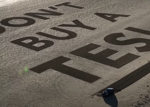Over the years, I have often been left confused by the actions of some of the people in our sector.
For many years, I blamed myself – I believed I must have missed a piece of information or that I didn’t understand the nuances of the industry. However, I have reached the conclusion that often people act in a way that is simply irrational. And there is a thin line between irrationality and what most people would regard as insanity.

Professor Jim Saker is
director of the Centre for
Automotive Management
at Loughborough
University’s Business
School and an
AM Awards judge.
He has been involved
in the automotive
industry for more
than 20 years.
An example came to my notice recently. A daughter of one of my colleagues was attempting to buy a Suzuki from a dealership in the north-west. Having researched the competition and the offers that were available, the negotiation process started. The customer had a price in mind and they were not prepared to move upwards from it.
At the end of the discussion, the dealership stated that this deal was not possible and both sides parted company.
Later that day, the customer went to Carwow’s website and asked for offers on the aforementioned vehicle. Ironically, the best offer came from the dealership that the customer had walked away from earlier in the day. But the dealer was offering exactly the same terms that it had rejected previously.
The customer dutifully went back to the dealership and said they would like the car on those terms either direct or via Carwow. There was no explanation of the change of heart from the dealer.
The problem this creates is that the buyer now knows not to believe what is being said in the face-to-face interaction. In future, they will always seek some other form of verification.
From my view as a researcher and observer of the industry, this type of behaviour is irrational and damaging. It reinforces the view that what is said by us cannot be trusted. Whether it be the falsification of emission test results or going back on your word, this type of behaviour is untenable in a world that is becoming increasingly transparent.
As a marketing academic, I still smile at a situation I came across a few years ago, where a well known French car manufacturer used to apportion its marketing budget in a country in proportion to its market share. If the market share fell, the marketing budget was reduced in line with this figure, encouraging a spiral downwards. I understand the concept of a lean operation and working smarter, but have yet to understand the marketing philosophy that suggests you arrest a downward trend by spending less.
You still occasionally see signs and mugs on desks that read: ‘You don’t have to be mad to work here, but it helps’. I am coming around to the conclusion that motor retail often places a little too much faith in those words.















John Hughes - 03/10/2017 15:49
It's interesting that this focused on carwow. When presented with this issue I always say it's a supply and demand thing, I mean why would you give fleet companies different rates than that of a private customer? Because they supply the numbers and so can carwow. Ultimately dealerships have to make the most they can out of every deal and try to stop leakage, hence why they don't offer all consumers the same deal. Manufacturers have the power to stop carwow overnight with fixed pricing across their networks but they won't do it, they want the competition within their network. After all, it's another registration for them anyway.